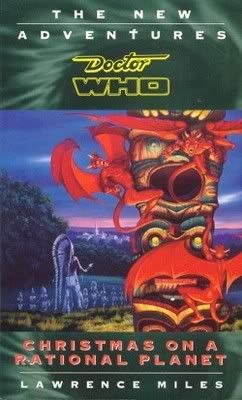 Christmas on a Rational Planet by Lawrence Miles
In Brief: As New York State parties like it's 1799 (which it is) the powers of a cacophonous universe want to replace reality.
Pardon me as I struggle to come to grips with exactly what to say about Christmas on a Rational Planet. The book is audacious, confusing, rather mad and quite quite brilliant. It doesn't so much expand the possibilities of what can be done with the continuing narrative of Doctor Who as much as cut up what has come before, put it in a blender, add some paste and mash together a novel with the result.
First I'll get that pesky thing known as "the plot" out of the way: Roz is trapped in a small town in New York State in 1799, otherwise known as The Age of Reason. As she tries to find The Doctor the Tardis (with Chris inside) is attacked by a force from outside of the universe.
Ok, now that's done we can look at the big picture of what I *think* Miles was getting at. Essentially what he tries here is a total redefinition of The Doctor and indeed the entire past history of the series itself in regards to how much it should fit into any continuing narrative. The main goal is to tear apart the past where The Doctor is the force which "puts right" the problems of the universe. In its place is the view the The Doctor imposes his Reason where he sees fits, as his role as a Watchmaker (aka Time Lord) is to bring order to chaos. However in Christmas on a Rational Planet chaos/cacophony is not a force of evil or destruction but rather the universe as it was in an earlier time, when impossible things ruled before order was forced upon reality. Order and Reason are seen as limiting factors of possibility (such as how slavish attention to the past continuity of Who limits the future).
What Miles does brilliantly is to make the voice of chaos and cacophony ironically reasonable, with a universe of disorder being an appealing proposition. In fact so appealing is this option that the day is "won" not through any defeat of chaos but rather through trickery. Chaos is only banished and will always be looking for cracks into which to place unreasonable things.
The book plays with past continuity in a major way, with minor references being made to practically every televised story in some way. This can range from flash-backs to The Power of the Daleks to the odd re-quote of Professor Zaroff and beyond. Rather than be gratuitous these references serve to reinforce the place of chaos in the Doctor Who universe. Has the show ever *really* had a consistent narrative, and in fact should it even bother? The book's answer is a resolute NO IT DAMN WELL SHOULD NOT!
It acts basically as a big middle finger to those who require that the history of the show make some sort of sense or Reason. Doctor Who has always (and should always) be a series without a "bible", one that is able to change the rules when it sees fit rather than have to adhere to some sort of unbreakable narrative which can never be contradicted.
Unlike some series starting in Star that I could mention. Where else would you end up with antire episodes devoted to the reasons behind a makeup change for the Klingons?
Miles wants to throw out notions of "continuity" and keep the concept of Doctor Who free to do what it wants, and thus having a universe of chaos just next door allows the show to contain a myriad of impossible things.
Now back to the "but is it any good?" part: Yes, Christmas on a Rational Planet breaks completely new ground in what can be done with Doctor Who. It's the first book really since the early days of Timewyrm: Revelation or Transit to completely redefine what we can think of as "Doctor Who story". It's amazing how as this part of the series history begins to close (with only 9 books left to go) once again we see an upswing in quality (echoing the 1988/89 years on TV). Doctor Who always seems to be at its best when up against the wall.
Christmas on a Rational Planet by Lawrence Miles
In Brief: As New York State parties like it's 1799 (which it is) the powers of a cacophonous universe want to replace reality.
Pardon me as I struggle to come to grips with exactly what to say about Christmas on a Rational Planet. The book is audacious, confusing, rather mad and quite quite brilliant. It doesn't so much expand the possibilities of what can be done with the continuing narrative of Doctor Who as much as cut up what has come before, put it in a blender, add some paste and mash together a novel with the result.
First I'll get that pesky thing known as "the plot" out of the way: Roz is trapped in a small town in New York State in 1799, otherwise known as The Age of Reason. As she tries to find The Doctor the Tardis (with Chris inside) is attacked by a force from outside of the universe.
Ok, now that's done we can look at the big picture of what I *think* Miles was getting at. Essentially what he tries here is a total redefinition of The Doctor and indeed the entire past history of the series itself in regards to how much it should fit into any continuing narrative. The main goal is to tear apart the past where The Doctor is the force which "puts right" the problems of the universe. In its place is the view the The Doctor imposes his Reason where he sees fits, as his role as a Watchmaker (aka Time Lord) is to bring order to chaos. However in Christmas on a Rational Planet chaos/cacophony is not a force of evil or destruction but rather the universe as it was in an earlier time, when impossible things ruled before order was forced upon reality. Order and Reason are seen as limiting factors of possibility (such as how slavish attention to the past continuity of Who limits the future).
What Miles does brilliantly is to make the voice of chaos and cacophony ironically reasonable, with a universe of disorder being an appealing proposition. In fact so appealing is this option that the day is "won" not through any defeat of chaos but rather through trickery. Chaos is only banished and will always be looking for cracks into which to place unreasonable things.
The book plays with past continuity in a major way, with minor references being made to practically every televised story in some way. This can range from flash-backs to The Power of the Daleks to the odd re-quote of Professor Zaroff and beyond. Rather than be gratuitous these references serve to reinforce the place of chaos in the Doctor Who universe. Has the show ever *really* had a consistent narrative, and in fact should it even bother? The book's answer is a resolute NO IT DAMN WELL SHOULD NOT!
It acts basically as a big middle finger to those who require that the history of the show make some sort of sense or Reason. Doctor Who has always (and should always) be a series without a "bible", one that is able to change the rules when it sees fit rather than have to adhere to some sort of unbreakable narrative which can never be contradicted.
Unlike some series starting in Star that I could mention. Where else would you end up with antire episodes devoted to the reasons behind a makeup change for the Klingons?
Miles wants to throw out notions of "continuity" and keep the concept of Doctor Who free to do what it wants, and thus having a universe of chaos just next door allows the show to contain a myriad of impossible things.
Now back to the "but is it any good?" part: Yes, Christmas on a Rational Planet breaks completely new ground in what can be done with Doctor Who. It's the first book really since the early days of Timewyrm: Revelation or Transit to completely redefine what we can think of as "Doctor Who story". It's amazing how as this part of the series history begins to close (with only 9 books left to go) once again we see an upswing in quality (echoing the 1988/89 years on TV). Doctor Who always seems to be at its best when up against the wall.
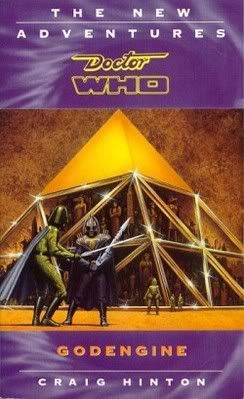 GodEngine by Craig Hinton
In Brief: With the Tardis destroyed (Yeah, right), The Doctor, Roz and Chris are trapped on Mars and must deal with a Deadly Doomsday Weapon of Deadly Doom.
Meanwhile, a group of Ice Warriors work through a love-triangle and other personal problems. A surprise admission of pregnancy is involved.
It was true in reviews from 1996 and it's true now, GodEngine is God-awful. However it's awful in an (almost) amusingly wrong-headed "What was the author *thinking*?!!" sort of way. The biggest problem with the book *isn't* its sub-par prose style, poor plotting or terrible characterisation. IMHO the really big issue, which had me shaking my head bemusedly throughout most of the book, is how Hinton actually manages to write a Doctor Who book which actually isn't a Doctor Who story.
What do I mean by that? I'm loathe to ever say that there is a "right" way to put together a Doctor Who plot since the format of the series is so open format. From a high level a story involving The Doctor & Co. encountering Ice Warriors on Mars and having to stop a big super-weapon should be business-as-usual, if unimaginative. However the problem I had with GodEngine, and it's similar to what I experienced a loooong while back with the horrid Shadowmind, is that the author has decided that they'd rather write a book for a different series and try to shoe-horn it into the Doctor Who lexicon.
Now often this style of genre-melding can work quite well, as great fun is had with landing the Tardis in the middle of a medieval-adventure/space-opera/Agatha Christie-mystery/etc. and watching the result. However the issue with GodEngine is that the book is primarily a Star Trek/Babylon 5 story with a few Doctor Who trappings added.
GodEngine by Craig Hinton
In Brief: With the Tardis destroyed (Yeah, right), The Doctor, Roz and Chris are trapped on Mars and must deal with a Deadly Doomsday Weapon of Deadly Doom.
Meanwhile, a group of Ice Warriors work through a love-triangle and other personal problems. A surprise admission of pregnancy is involved.
It was true in reviews from 1996 and it's true now, GodEngine is God-awful. However it's awful in an (almost) amusingly wrong-headed "What was the author *thinking*?!!" sort of way. The biggest problem with the book *isn't* its sub-par prose style, poor plotting or terrible characterisation. IMHO the really big issue, which had me shaking my head bemusedly throughout most of the book, is how Hinton actually manages to write a Doctor Who book which actually isn't a Doctor Who story.
What do I mean by that? I'm loathe to ever say that there is a "right" way to put together a Doctor Who plot since the format of the series is so open format. From a high level a story involving The Doctor & Co. encountering Ice Warriors on Mars and having to stop a big super-weapon should be business-as-usual, if unimaginative. However the problem I had with GodEngine, and it's similar to what I experienced a loooong while back with the horrid Shadowmind, is that the author has decided that they'd rather write a book for a different series and try to shoe-horn it into the Doctor Who lexicon.
Now often this style of genre-melding can work quite well, as great fun is had with landing the Tardis in the middle of a medieval-adventure/space-opera/Agatha Christie-mystery/etc. and watching the result. However the issue with GodEngine is that the book is primarily a Star Trek/Babylon 5 story with a few Doctor Who trappings added.

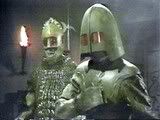
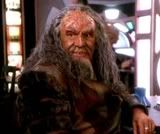 The biggest clue for me was the treatment of the Ice Warriors. In the series proper they're possibly the dullest of the trope of returning monsters we've had over the years. Other than being well designed (for the 60s) they're possibly the most *generic* villain/monster ever to appear in the series. They're really just there to do a bit of "WE WILL CRUSH YOU PUNY HUMAN!" as they invade The Moon/Future Ice-covered England/Peladon. It's telling that they're the only major "classic" monster that has not appeared in the show post-2005, I suspect mainly since there's really nothing interesting that can be done with them.
Although I would love to be proven wrong. *After* the Zarbi are brought back of course.
Yet suddenly Hinton has turned them into pseudo-Klingons/Narns with a "noble and long" history of warfare and honour. While there's nothing wrong with an author wanting to beef up what was before an extremely underwritten group, but in GodEngine it's just far too obvious that Hinton wants to turn them into a Star Trek: TNG/DS9 style of alien race. Complete with love-triangles and big sword-fights o' honour. In this regard I found the book to be one of the most dated of the range as this type of "sci-fi" is *so* very 90s.
With the Ice Warriors brought into the foreground so it means that The Doctor seems to almost disappear for most of the book, only popping up in the narrative now and again to spew some exposition and perform his deus ex machina duties when everything starts blowing up. And while there have been many books in the series where The Doctor is somewhat in the background the other regulars are too underwritten to liven things up. Without Benny to act as the "audience identification character" we're left with Chris & Roz who as characters most authors struggle with at the best of times. Chris in particular hasn't been able to move past his inital character description of being "naive and enthusiastic" and is rather irritating as a result. While Roz has managed a bit more depth she's still at times lumbered with being "New Ace V2.0".
However again I have to remember that this book came out in 1996, when B5 and the various Star Trek series were the big names in anything sci-fi/fantasy. I can understand the temptation to take either of those shows as a template on how to do Doctor Who. With the way that the show had ended on a whimper back in 1989 there was a lot of "what if..." going as as the fan-sphere tried to figure out what, if the show were ever to come back, form it should take. So it makes sense to take what is popular at the time, but also completely wrong. When the show *did* come back in 2005 its success was down to really going back to basics in being "an adventure in time and space" and not be a Farscape/Andromeda/Star Trek clone.
With Benny being gone as a regular we've entered the last phase of the New Adventures, since there are now only 11 books to go before the series ends. Over the next run of books the impact of the Paul McGann TV-movie will be increasingly felt. With the BBC deciding to bring the range "in-house" from Virgin Publishing as well as the obvious need to finally move away from the 7th-Doctor things begin to ramp up towards this phase of the series. This is a case where knowledge of what came later is impacting how I see GodEngine since it's basically the last Old-Monsters run-around in the range.
Even the covers of the books have begun to reflect the coming changes, with the late 80s Doctor Who logo given less emphasis and a notable lack of actually featuring The Doctor on the covers.
Otherwise there's just not much else to say, although I've managed to type quite a lot around a book I didn't really enjoy very much (how *me*). GodEngine is easily one of the weakest entries in the entirety of the New Adventures and harkens back to the big stumbles from the start of the series. I can't even give it an "at least it tried" since too much effort went into turning Doctor Who into a 90s-style Sci-Fi story. This sort of "Let's make Doctor Who more like X!" thinking is thankfully something we've never really got in the show proper (barring the 1996 TV-movie, one of its many sins). If any positive from this book can be found it's that at least it made me appreciate how very good indeed most of the series has been.
The biggest clue for me was the treatment of the Ice Warriors. In the series proper they're possibly the dullest of the trope of returning monsters we've had over the years. Other than being well designed (for the 60s) they're possibly the most *generic* villain/monster ever to appear in the series. They're really just there to do a bit of "WE WILL CRUSH YOU PUNY HUMAN!" as they invade The Moon/Future Ice-covered England/Peladon. It's telling that they're the only major "classic" monster that has not appeared in the show post-2005, I suspect mainly since there's really nothing interesting that can be done with them.
Although I would love to be proven wrong. *After* the Zarbi are brought back of course.
Yet suddenly Hinton has turned them into pseudo-Klingons/Narns with a "noble and long" history of warfare and honour. While there's nothing wrong with an author wanting to beef up what was before an extremely underwritten group, but in GodEngine it's just far too obvious that Hinton wants to turn them into a Star Trek: TNG/DS9 style of alien race. Complete with love-triangles and big sword-fights o' honour. In this regard I found the book to be one of the most dated of the range as this type of "sci-fi" is *so* very 90s.
With the Ice Warriors brought into the foreground so it means that The Doctor seems to almost disappear for most of the book, only popping up in the narrative now and again to spew some exposition and perform his deus ex machina duties when everything starts blowing up. And while there have been many books in the series where The Doctor is somewhat in the background the other regulars are too underwritten to liven things up. Without Benny to act as the "audience identification character" we're left with Chris & Roz who as characters most authors struggle with at the best of times. Chris in particular hasn't been able to move past his inital character description of being "naive and enthusiastic" and is rather irritating as a result. While Roz has managed a bit more depth she's still at times lumbered with being "New Ace V2.0".
However again I have to remember that this book came out in 1996, when B5 and the various Star Trek series were the big names in anything sci-fi/fantasy. I can understand the temptation to take either of those shows as a template on how to do Doctor Who. With the way that the show had ended on a whimper back in 1989 there was a lot of "what if..." going as as the fan-sphere tried to figure out what, if the show were ever to come back, form it should take. So it makes sense to take what is popular at the time, but also completely wrong. When the show *did* come back in 2005 its success was down to really going back to basics in being "an adventure in time and space" and not be a Farscape/Andromeda/Star Trek clone.
With Benny being gone as a regular we've entered the last phase of the New Adventures, since there are now only 11 books to go before the series ends. Over the next run of books the impact of the Paul McGann TV-movie will be increasingly felt. With the BBC deciding to bring the range "in-house" from Virgin Publishing as well as the obvious need to finally move away from the 7th-Doctor things begin to ramp up towards this phase of the series. This is a case where knowledge of what came later is impacting how I see GodEngine since it's basically the last Old-Monsters run-around in the range.
Even the covers of the books have begun to reflect the coming changes, with the late 80s Doctor Who logo given less emphasis and a notable lack of actually featuring The Doctor on the covers.
Otherwise there's just not much else to say, although I've managed to type quite a lot around a book I didn't really enjoy very much (how *me*). GodEngine is easily one of the weakest entries in the entirety of the New Adventures and harkens back to the big stumbles from the start of the series. I can't even give it an "at least it tried" since too much effort went into turning Doctor Who into a 90s-style Sci-Fi story. This sort of "Let's make Doctor Who more like X!" thinking is thankfully something we've never really got in the show proper (barring the 1996 TV-movie, one of its many sins). If any positive from this book can be found it's that at least it made me appreciate how very good indeed most of the series has been.
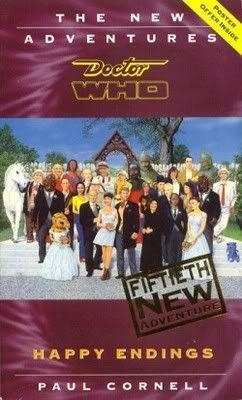 Happy Endings by Paul Cornell
In Brief: It's Benny & Jason's wedding and everyone's invited.
Even The Master.
Happy Endings is one big wedding-cake of a book: Huge, sprawling, over-done, sugary, loud, important and not actually very good. Considering that Paul Cornell has written several of the best entries in the New Adventures (and also No Future) as well as that I remembered really enjoying this "celebration" of the series back when I read it in 1996 I was surprised to find the book trite and irritating this time around. The whole thing really just felt lazy with the book being rather smug and feeling like a massive inside-joke rather than a proper piece of literature.
The plot of the book is purposefully light, which isn't necessarily a bad thing (for instance the similarly "light" The Also People was brilliant) but here has no interesting environment or characters to fill the gap. Most of the book involves the various guests arriving from all of time and space in the village of Cheldon Bonniface (from Cornell's earlier Timewyrm: Revelation) in the far-off year of 2010. There's a reference to almost every other book in the New Adventures, with many characters getting a bit of a coda to their previous adventure. I remembered "back in the day" really liking the rather insane result with sub-plots involving Roz, Chris and Sherlock Holmes meeting up with The Brigadier to thwart a small plot by The Master. Or the camp light-entertainment Silurians.
But this time the whole thing just felt too indulgent. What was also frustration is that a much better book occasionally peeked out, cutting through all of the fluff like a knife. The Brigadier's story involving his facing his death due to illness in old age is beautifully bitter-sweet and gives the book a much needed twinge of sadness to counter-point the festivities. Unfortunately it doesn't last long and ends uncomfortably, with the character given an unlikely extra lease on life.
Overall, perhaps Happy Endings is perhaps too self-conscious, being too meta-textual and self-referential for its own good (although it *was* the mid-90s when irony was king). Or maybe I'm just a miserable sort who can't join along with any sort of fun. But regardless I found a lot of the book somewhat tedious (in particular the large section in the middle that describes in great detail a game of cricket between the village locals and the wedding-guests). Everything just felt too forced, too artificial. Comparable television stories would be the likes of earlier "celebrations" such as The Three Doctors or The Five Doctors which suffered under the weight of being "events" rather than decent stories.
More modern examples include "Journey's End", "The End of Time" or any Steven Moffat-penned episode from 2011.
Doctor Who just doesn't work for me when it spends too much time looking backwards at its own history. Things become too bogged down in silly detail and it just sucks the fun out of everything, which is perhaps the ultimate irony of Happy Endings. But like I said, 15 years ago I clearly recall gobbling this up, loving all of the references to old stories and "getting" the jokes. This time around I needed substance under all of the light-hearted romping.
But at the same time I shouldn't complain too much considering that at least the book tried something different for the series. While my opinion of Happy Endings is no longer what is once was at least the book was never boring (except for the cricket bit that is) and at least kept me reading despite the irritation. And the book does end very well, with Ace (or Dorothee as she's now known) getting a lovely scene with her Mum while Benny & Jason start a new life exploring time and space away from the Tardis (thanks to some time-rings provided by The Doctor).
Happy Endings by Paul Cornell
In Brief: It's Benny & Jason's wedding and everyone's invited.
Even The Master.
Happy Endings is one big wedding-cake of a book: Huge, sprawling, over-done, sugary, loud, important and not actually very good. Considering that Paul Cornell has written several of the best entries in the New Adventures (and also No Future) as well as that I remembered really enjoying this "celebration" of the series back when I read it in 1996 I was surprised to find the book trite and irritating this time around. The whole thing really just felt lazy with the book being rather smug and feeling like a massive inside-joke rather than a proper piece of literature.
The plot of the book is purposefully light, which isn't necessarily a bad thing (for instance the similarly "light" The Also People was brilliant) but here has no interesting environment or characters to fill the gap. Most of the book involves the various guests arriving from all of time and space in the village of Cheldon Bonniface (from Cornell's earlier Timewyrm: Revelation) in the far-off year of 2010. There's a reference to almost every other book in the New Adventures, with many characters getting a bit of a coda to their previous adventure. I remembered "back in the day" really liking the rather insane result with sub-plots involving Roz, Chris and Sherlock Holmes meeting up with The Brigadier to thwart a small plot by The Master. Or the camp light-entertainment Silurians.
But this time the whole thing just felt too indulgent. What was also frustration is that a much better book occasionally peeked out, cutting through all of the fluff like a knife. The Brigadier's story involving his facing his death due to illness in old age is beautifully bitter-sweet and gives the book a much needed twinge of sadness to counter-point the festivities. Unfortunately it doesn't last long and ends uncomfortably, with the character given an unlikely extra lease on life.
Overall, perhaps Happy Endings is perhaps too self-conscious, being too meta-textual and self-referential for its own good (although it *was* the mid-90s when irony was king). Or maybe I'm just a miserable sort who can't join along with any sort of fun. But regardless I found a lot of the book somewhat tedious (in particular the large section in the middle that describes in great detail a game of cricket between the village locals and the wedding-guests). Everything just felt too forced, too artificial. Comparable television stories would be the likes of earlier "celebrations" such as The Three Doctors or The Five Doctors which suffered under the weight of being "events" rather than decent stories.
More modern examples include "Journey's End", "The End of Time" or any Steven Moffat-penned episode from 2011.
Doctor Who just doesn't work for me when it spends too much time looking backwards at its own history. Things become too bogged down in silly detail and it just sucks the fun out of everything, which is perhaps the ultimate irony of Happy Endings. But like I said, 15 years ago I clearly recall gobbling this up, loving all of the references to old stories and "getting" the jokes. This time around I needed substance under all of the light-hearted romping.
But at the same time I shouldn't complain too much considering that at least the book tried something different for the series. While my opinion of Happy Endings is no longer what is once was at least the book was never boring (except for the cricket bit that is) and at least kept me reading despite the irritation. And the book does end very well, with Ace (or Dorothee as she's now known) getting a lovely scene with her Mum while Benny & Jason start a new life exploring time and space away from the Tardis (thanks to some time-rings provided by The Doctor).
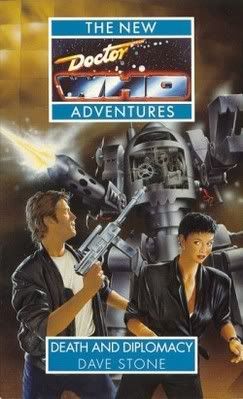 Death and Diplomacy by Dave Stone
In Brief: While The Doctor acts as mediator for a trio of warring factions (and the three-eyed cat creatures who are secretly controlling them) Benny gets engaged. Roz and Chris wander around a bit.
While its entertaining, overall Death and Diplomacy ends up being rather unsatisfying. No part of the book is bad, and in fact much of it is very inventive, but the whole thing just never comes together as it should. It felt like 3 different novellas tenuously linked together without a proper resolution. However, I suspect Stone realised this problem when The Doctor even comments that the resolution was a bit of an anti-climax.
I could comment that this may reflect my feelings towards the latest series on TV, but I've harped on enough concerning my issues with "Series 6".
After the Tardis crew is plucked from the ship and end up in various parts of a distant cluster of stars the plot-strands settle down to being:
1. The Doctor must handle the intrigue of mediation between 3 warring races who all worship mysterious beings known as The Hollow Gods.
2. Bernice finds herself stuck on a rather dilapidated space-ship with Doctor Who's answer to Han Solo, Mr. Jason Kane. Boinking ensues.
3. Chris and Roz wander around and get into various fights and gun-battles.
Then at the end they all meet up and go home. And stuff blows up.
The biggest problem I had with the novel is that there's really not a lot that goes on beyond meandering and a few coincidences too big to really accept. While more tempered than Stone's earlier Sky Pirates! he's still not really gotten the grasp of plotting and pacing. In their place we find Stone's very Douglas Adams-like sense of humour, which while not bad does tend to give the book a *very* 1990s post-modern sentiment. This was definitely a product of the "Scream"/"Buffy"/"Farscape" years of not-so-subtly winking at the audience. While not disastrous by any means it does lend the book a somewhat dated feel compared to the rest of the series and left me not quite caring what was going on.
Another problem was that the character of Jason just doesn't really work for me. He's shallow, manipulative and immature and only the fact that Benny seems to really *really* like having sex with him explains her agreeing to get married at the end of the book. Girl, you can do better.
But I'm making it sound like I found Death and Diplomacy to be a bad book, which I didn't. I think it's just that it's a novel I didn't feel fulfilled its potential. Dave Stone *can* write, he just needed to move away from the too-jokey style which was distracting. So while still a good book with some great ideas I can't help but feel this is the New Adventures equivalent to The Horns of Nimon, a fun time but overall lacking.
Death and Diplomacy by Dave Stone
In Brief: While The Doctor acts as mediator for a trio of warring factions (and the three-eyed cat creatures who are secretly controlling them) Benny gets engaged. Roz and Chris wander around a bit.
While its entertaining, overall Death and Diplomacy ends up being rather unsatisfying. No part of the book is bad, and in fact much of it is very inventive, but the whole thing just never comes together as it should. It felt like 3 different novellas tenuously linked together without a proper resolution. However, I suspect Stone realised this problem when The Doctor even comments that the resolution was a bit of an anti-climax.
I could comment that this may reflect my feelings towards the latest series on TV, but I've harped on enough concerning my issues with "Series 6".
After the Tardis crew is plucked from the ship and end up in various parts of a distant cluster of stars the plot-strands settle down to being:
1. The Doctor must handle the intrigue of mediation between 3 warring races who all worship mysterious beings known as The Hollow Gods.
2. Bernice finds herself stuck on a rather dilapidated space-ship with Doctor Who's answer to Han Solo, Mr. Jason Kane. Boinking ensues.
3. Chris and Roz wander around and get into various fights and gun-battles.
Then at the end they all meet up and go home. And stuff blows up.
The biggest problem I had with the novel is that there's really not a lot that goes on beyond meandering and a few coincidences too big to really accept. While more tempered than Stone's earlier Sky Pirates! he's still not really gotten the grasp of plotting and pacing. In their place we find Stone's very Douglas Adams-like sense of humour, which while not bad does tend to give the book a *very* 1990s post-modern sentiment. This was definitely a product of the "Scream"/"Buffy"/"Farscape" years of not-so-subtly winking at the audience. While not disastrous by any means it does lend the book a somewhat dated feel compared to the rest of the series and left me not quite caring what was going on.
Another problem was that the character of Jason just doesn't really work for me. He's shallow, manipulative and immature and only the fact that Benny seems to really *really* like having sex with him explains her agreeing to get married at the end of the book. Girl, you can do better.
But I'm making it sound like I found Death and Diplomacy to be a bad book, which I didn't. I think it's just that it's a novel I didn't feel fulfilled its potential. Dave Stone *can* write, he just needed to move away from the too-jokey style which was distracting. So while still a good book with some great ideas I can't help but feel this is the New Adventures equivalent to The Horns of Nimon, a fun time but overall lacking.
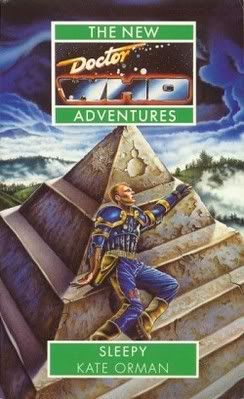 SLEEPY by Kate Orman
In Brief: The Doctor & Co. must help an Earth-colony suffering from a sudden bought of telepathy. Sentient computers and secret-projects are involved.
SLEEPY was another of the New Adventures of which I remembered nothing from my original read back in 1996. As such it felt really like I was reading a completely new novel. It's not that the book is bad, it's just that with no BIG EVENTS happening not a lot stuck in the memory after 15 years. I was pleasantly surprised to find that SLEEPY is actually somewhat of a neglected gem. Particularly after the heavy-going in Just War and Warchild it makes for a nice contrast.
And it's not to say that the book is by any means filled with just Hugs & Puppies, it's just not as *HEAVY* as some recent reads.
But what of the plot? It involves the Tardis crew trying to help the colonists on Yemaya to try to find out why some people have suddenly developed enhanced mental powers. Finding the truth involves not a forgotten ancient super-race (while there are artifacts on the planet it's a big red herring) but rather a trip into the past for Bernice and Roz. Meanwhile Chris has to cope with his becoming psychic due to what turns out to be a manufactured virus. The cause of that virus leads to the discovery of the titular artificial intelligence SLEEPY.
Another major contrast with the previous book Warchild is that all of the regulars are deeply involved in events, especially The Doctor. Orman again really gets into the psyche of the time-lord, in particular when he suffers psychic attacks from the military troops sent to sort out the problems on Yemaya. While many authors keep the character as the inscrutable outsider here with get a detailed view into his thoughts and a sense that there's a larger game he's playing with the universe, with the lives of his friends hanging in the balance. It really sets up the sense that he'll have to pay a high price down the road.
One joy of re-reading the series is picking up the foreshadowing which I totally missed back in the mid-90s.
Also a positive in SLEEPY is how non-European the colonists are, with most having an African or Australian background. It's a small touch, but one which adds a nice texture to the story. I suspect this is a side-benefit of having non-British authors write for Doctor Who. As well, Orman gives a good chunk of the action to Bernice and Roz as well as other strong female characters throughout the novel. Meanwhile Chris remains somewhat useless.
One could very easily class Orman as the anti-Mark Gatiss, since all of his characters seem to be slight variations on straight army-soldiers from the 1940s.
So while SLEEPY may be a bit of a "small story" in the series it's still a very enjoyable book. Kate Orman gets into the head of The Doctor like no other and really expands the possibilities of the character. It's unfortunate that this richness of character can really only happen in a novel as the 45-minute confines of a TV episode don't really allow for as much depth (particularly with all of the corridor running). It reminds me that in a lot of ways I became a Doctor Who fan as much due to The New Adventures as the show proper.
SLEEPY by Kate Orman
In Brief: The Doctor & Co. must help an Earth-colony suffering from a sudden bought of telepathy. Sentient computers and secret-projects are involved.
SLEEPY was another of the New Adventures of which I remembered nothing from my original read back in 1996. As such it felt really like I was reading a completely new novel. It's not that the book is bad, it's just that with no BIG EVENTS happening not a lot stuck in the memory after 15 years. I was pleasantly surprised to find that SLEEPY is actually somewhat of a neglected gem. Particularly after the heavy-going in Just War and Warchild it makes for a nice contrast.
And it's not to say that the book is by any means filled with just Hugs & Puppies, it's just not as *HEAVY* as some recent reads.
But what of the plot? It involves the Tardis crew trying to help the colonists on Yemaya to try to find out why some people have suddenly developed enhanced mental powers. Finding the truth involves not a forgotten ancient super-race (while there are artifacts on the planet it's a big red herring) but rather a trip into the past for Bernice and Roz. Meanwhile Chris has to cope with his becoming psychic due to what turns out to be a manufactured virus. The cause of that virus leads to the discovery of the titular artificial intelligence SLEEPY.
Another major contrast with the previous book Warchild is that all of the regulars are deeply involved in events, especially The Doctor. Orman again really gets into the psyche of the time-lord, in particular when he suffers psychic attacks from the military troops sent to sort out the problems on Yemaya. While many authors keep the character as the inscrutable outsider here with get a detailed view into his thoughts and a sense that there's a larger game he's playing with the universe, with the lives of his friends hanging in the balance. It really sets up the sense that he'll have to pay a high price down the road.
One joy of re-reading the series is picking up the foreshadowing which I totally missed back in the mid-90s.
Also a positive in SLEEPY is how non-European the colonists are, with most having an African or Australian background. It's a small touch, but one which adds a nice texture to the story. I suspect this is a side-benefit of having non-British authors write for Doctor Who. As well, Orman gives a good chunk of the action to Bernice and Roz as well as other strong female characters throughout the novel. Meanwhile Chris remains somewhat useless.
One could very easily class Orman as the anti-Mark Gatiss, since all of his characters seem to be slight variations on straight army-soldiers from the 1940s.
So while SLEEPY may be a bit of a "small story" in the series it's still a very enjoyable book. Kate Orman gets into the head of The Doctor like no other and really expands the possibilities of the character. It's unfortunate that this richness of character can really only happen in a novel as the 45-minute confines of a TV episode don't really allow for as much depth (particularly with all of the corridor running). It reminds me that in a lot of ways I became a Doctor Who fan as much due to The New Adventures as the show proper.
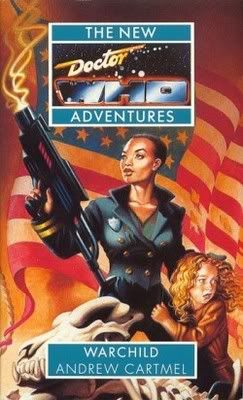 Warchild by Andrew Cartmel
In Brief: A tale of psychic teens and killer hounds.
One thing to know about Warchild is that it wraps up Andrew Cartmel's "War" trilogy that started way back with Cat's Cradle: Warhead which was book #6 in the series (oh so very long ago) and then continued in the more resent Warlock. Unfortunately *another* thing to know about Warchild is that it's not quite as as the other two books, although this really only means that it's still very good.
The main issue for me was the rather poor structuring that Cartmel used, in that about 2/3rds of the novel feels like a 1st-act setup with subsequent events being rushed through in the final 50 pages. With all of the New Adventures being in the 250-300 page range I almost suspect Cartmel saw the page-limit approaching and realised he had to quickly wrap things up. It's a shame since while events are somewhat drawn out they're never less than totally engrossing. Basically the book should have been longer.
But back to the good. Cartmel's strength, as in his 2 other novels in the series, is his excellent writing-style, particularly in his characterisation. Most of the events in Warchild follow those of the earlier books, especially concerning the character of Jack and the state he's left in after Warlock (his body in suspension and mind held in a dog). Most of the book is actually devoted to characters from the earlier novels rather than the series regulars, in particular government-agent Creed.
The Doctor and Benny are mainly absent as they spend their time reviving Jack's body in the Doctor's house while Chris is undercover as a monk at Ricky's school. Of the regular Roz gets most of the action, although she's somewhat more Ace-like than recently as she joins up with a military crew dealing with the problem of thousands of dogs suddenly forming a giant pack and turning on their owners.
Interestingly although Warchild is set about 15 years after Warlock (which was around 10 years after Warhead) this book is much less "futuristic", other than a few mentions of holographs this could have been set in the 1990s rather than 2030s. As a result the book feels far less dated the earlier ones. I'm thinking that the "Cyberpunk" trend of 1992 was less popular than in 1996 when this book was published, the future wasn't quite looking so bleak.
This being a Cartmel book we're also privy to some more of his personal politics. Rather than concentrating on the "horrors of technology/pollution" or Animal-Rights here we have some in-depth views on the psychology of leadership. Much of the story revolves around Creed's son Ricky and his ability to sway other people's emotions and the threat this can pose if put into the wrong hands. Perhaps having the long "1st-act" concentrating on the menace of the controlled pack of dogs helps show what the menace of having an Alpha Male human in charge of society would be like. Cartmel is definitely of the ilk who sees humans as mildly over-evolved apes so this animalistic leaning fits.
But it's the plot-line around Ricky that leaves the reader feeling that things don't really come together. Everything gets wrapped up a little too quickly.
However this is a minor complaint about what was still a very good book in the range. I admire Andrew Cartmel's ability to weave a good story around a central concept that's worth some contemplation (the impact of body language and how it can cause others to fall into line). This alone puts Warchild well above so many other books (and indeed TV episodes) that have rather simpler tales to tell.
Warchild by Andrew Cartmel
In Brief: A tale of psychic teens and killer hounds.
One thing to know about Warchild is that it wraps up Andrew Cartmel's "War" trilogy that started way back with Cat's Cradle: Warhead which was book #6 in the series (oh so very long ago) and then continued in the more resent Warlock. Unfortunately *another* thing to know about Warchild is that it's not quite as as the other two books, although this really only means that it's still very good.
The main issue for me was the rather poor structuring that Cartmel used, in that about 2/3rds of the novel feels like a 1st-act setup with subsequent events being rushed through in the final 50 pages. With all of the New Adventures being in the 250-300 page range I almost suspect Cartmel saw the page-limit approaching and realised he had to quickly wrap things up. It's a shame since while events are somewhat drawn out they're never less than totally engrossing. Basically the book should have been longer.
But back to the good. Cartmel's strength, as in his 2 other novels in the series, is his excellent writing-style, particularly in his characterisation. Most of the events in Warchild follow those of the earlier books, especially concerning the character of Jack and the state he's left in after Warlock (his body in suspension and mind held in a dog). Most of the book is actually devoted to characters from the earlier novels rather than the series regulars, in particular government-agent Creed.
The Doctor and Benny are mainly absent as they spend their time reviving Jack's body in the Doctor's house while Chris is undercover as a monk at Ricky's school. Of the regular Roz gets most of the action, although she's somewhat more Ace-like than recently as she joins up with a military crew dealing with the problem of thousands of dogs suddenly forming a giant pack and turning on their owners.
Interestingly although Warchild is set about 15 years after Warlock (which was around 10 years after Warhead) this book is much less "futuristic", other than a few mentions of holographs this could have been set in the 1990s rather than 2030s. As a result the book feels far less dated the earlier ones. I'm thinking that the "Cyberpunk" trend of 1992 was less popular than in 1996 when this book was published, the future wasn't quite looking so bleak.
This being a Cartmel book we're also privy to some more of his personal politics. Rather than concentrating on the "horrors of technology/pollution" or Animal-Rights here we have some in-depth views on the psychology of leadership. Much of the story revolves around Creed's son Ricky and his ability to sway other people's emotions and the threat this can pose if put into the wrong hands. Perhaps having the long "1st-act" concentrating on the menace of the controlled pack of dogs helps show what the menace of having an Alpha Male human in charge of society would be like. Cartmel is definitely of the ilk who sees humans as mildly over-evolved apes so this animalistic leaning fits.
But it's the plot-line around Ricky that leaves the reader feeling that things don't really come together. Everything gets wrapped up a little too quickly.
However this is a minor complaint about what was still a very good book in the range. I admire Andrew Cartmel's ability to weave a good story around a central concept that's worth some contemplation (the impact of body language and how it can cause others to fall into line). This alone puts Warchild well above so many other books (and indeed TV episodes) that have rather simpler tales to tell.
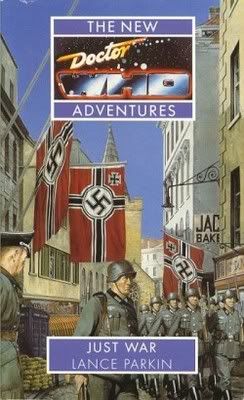 Just War by Lance Parkin
In Brief: It's 1941 and the Nazis control the channel islands and possess a new super-weapon with which to win the war against England. Aliens, parrallel-dimensions and alternate-timelines are (surprisingly) not involved.
It's getting more and more difficult to find ways of saying "the book was very good indeed" with the recent run. Other than Shakedown (which was more juvenile than bad) I think it's been at least a dozen New Adventures since I ran into a poor entry in the series. I have to wonder if the decision to finally get rid of Ace (or rather the version of the character we had towards the end) helped to inspire the various authors involved. Or it could just be that after some notably lesser efforts there was a greater effort put into quality control and in particular having fewer "first novels" thrown at the reader.
And having David A. McIntee not write anything after the horrible First Frontier was a boon.
Although ironically Just War is Lance Parkin's first book and it's one of the strongest entries in the series. This is a great book for the regulars and in particular Roz gets a chance to gain some real depth during the book as she pursues a romance in WW2-London (not so easy for a woman from the 30th-century). Roz really reinforces that having an older companions (in the case in their 40s along with the 30-something Benny) for The Doctor is a very good thing, having someone who is more of an equal leads to a much more dynamic setup compared to the screaming-youngsters so often seen on TV.
Of course for a TV show someone younger *does* make demographic sense.
Although unfortunately Chris has yet to really been given a chance to shine, most of the time being too much portrayed as a naive and immature. Although the authors *do* like to go on about his physique...
But through and through this is Benny's book. Most of the narrative centres around her mission for The Doctor to investigate a suspected German super-weapon that's been spotted near the occupied island of Guernsey. Passages as she's captured and tortured by the Germans are the most harrowing and intense events in the entire range of books as Parkin pulls no punches. We know that what she goes through *hurts* and it's through luck and skill that she's able to escape, not a rescue by The Doctor. Having a version of The Doctor who's more the background manipulator was a running theme throughout the New Adventures, however more and more there is foreshadowing that it's eventually going to come at a price.
Also Parkin goes a good job of not making the Nazis typical stereotyped villains through having most of the characters (bar Benny's torturer Wolff) be *almost* sympathetic. At the same time the English are not complete good-guys but instead must act as people do in a time of war.
So to sum up: Interesting setting, well-written characters and a satisfying resolution to the main mystery (the "super-weapon" is slightly advanced technology that is due to The Doctor being unwise in discussing ideas to a scientist on an earlier visit to Germany ). Just War is a fault-less, if intense, entry in the series.
Just War by Lance Parkin
In Brief: It's 1941 and the Nazis control the channel islands and possess a new super-weapon with which to win the war against England. Aliens, parrallel-dimensions and alternate-timelines are (surprisingly) not involved.
It's getting more and more difficult to find ways of saying "the book was very good indeed" with the recent run. Other than Shakedown (which was more juvenile than bad) I think it's been at least a dozen New Adventures since I ran into a poor entry in the series. I have to wonder if the decision to finally get rid of Ace (or rather the version of the character we had towards the end) helped to inspire the various authors involved. Or it could just be that after some notably lesser efforts there was a greater effort put into quality control and in particular having fewer "first novels" thrown at the reader.
And having David A. McIntee not write anything after the horrible First Frontier was a boon.
Although ironically Just War is Lance Parkin's first book and it's one of the strongest entries in the series. This is a great book for the regulars and in particular Roz gets a chance to gain some real depth during the book as she pursues a romance in WW2-London (not so easy for a woman from the 30th-century). Roz really reinforces that having an older companions (in the case in their 40s along with the 30-something Benny) for The Doctor is a very good thing, having someone who is more of an equal leads to a much more dynamic setup compared to the screaming-youngsters so often seen on TV.
Of course for a TV show someone younger *does* make demographic sense.
Although unfortunately Chris has yet to really been given a chance to shine, most of the time being too much portrayed as a naive and immature. Although the authors *do* like to go on about his physique...
But through and through this is Benny's book. Most of the narrative centres around her mission for The Doctor to investigate a suspected German super-weapon that's been spotted near the occupied island of Guernsey. Passages as she's captured and tortured by the Germans are the most harrowing and intense events in the entire range of books as Parkin pulls no punches. We know that what she goes through *hurts* and it's through luck and skill that she's able to escape, not a rescue by The Doctor. Having a version of The Doctor who's more the background manipulator was a running theme throughout the New Adventures, however more and more there is foreshadowing that it's eventually going to come at a price.
Also Parkin goes a good job of not making the Nazis typical stereotyped villains through having most of the characters (bar Benny's torturer Wolff) be *almost* sympathetic. At the same time the English are not complete good-guys but instead must act as people do in a time of war.
So to sum up: Interesting setting, well-written characters and a satisfying resolution to the main mystery (the "super-weapon" is slightly advanced technology that is due to The Doctor being unwise in discussing ideas to a scientist on an earlier visit to Germany ). Just War is a fault-less, if intense, entry in the series.
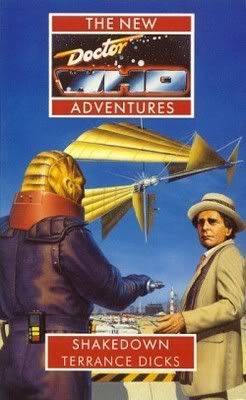 Shakedown by Terrance Dicks
In Brief: The Tardis crew are chasing a shape-changing spy who carries a "terrible secret" Hot on their heels are everybody's favourite potato-heads, The Sontarans.
What to say about Shakedown? Well, other than that it's written by Terrance Dicks. It's a typical Dicks effort in being a competently-written if extremely straight-forward book. Still, he knows how to put together an efficient Doctor Who story and really make it tick. Of course that's hardly a surprise considering the many many TV-stories he had involvement with through writing or script-editing from the 1960s through 80s.
And at least the novel never reaches the "no more than minimal description" depths of a Target novelisation.
However, what's notable about Shakedown is that it's partially a novelisation of a filmed story, albeit one that originally had no involvement at all from The Doctor.
Shakedown by Terrance Dicks
In Brief: The Tardis crew are chasing a shape-changing spy who carries a "terrible secret" Hot on their heels are everybody's favourite potato-heads, The Sontarans.
What to say about Shakedown? Well, other than that it's written by Terrance Dicks. It's a typical Dicks effort in being a competently-written if extremely straight-forward book. Still, he knows how to put together an efficient Doctor Who story and really make it tick. Of course that's hardly a surprise considering the many many TV-stories he had involvement with through writing or script-editing from the 1960s through 80s.
And at least the novel never reaches the "no more than minimal description" depths of a Target novelisation.
However, what's notable about Shakedown is that it's partially a novelisation of a filmed story, albeit one that originally had no involvement at all from The Doctor.
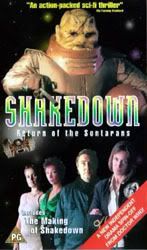 Back in the wilds of the mid-1990s, with it obvious that no new show was liable to ever appear in TV, some fans with resources at their command managed to produce several direct-to-video stories with a Doctor Who link. So with rights to some aspects of the show available (certain monsters and/or characters, but not The Doctor or Tardis) several videos were made which were semi-officially in the Who "universe". One of the more notable (as in having somewhat (comparatively) of a budget) was "Shakedown: The Return of the Sontarans", which was written by Terrance Dicks and starred several Doctor Who (and Blake's 7) actors, albeit none in their original roles.
Back in the wilds of the mid-1990s, with it obvious that no new show was liable to ever appear in TV, some fans with resources at their command managed to produce several direct-to-video stories with a Doctor Who link. So with rights to some aspects of the show available (certain monsters and/or characters, but not The Doctor or Tardis) several videos were made which were semi-officially in the Who "universe". One of the more notable (as in having somewhat (comparatively) of a budget) was "Shakedown: The Return of the Sontarans", which was written by Terrance Dicks and starred several Doctor Who (and Blake's 7) actors, albeit none in their original roles.
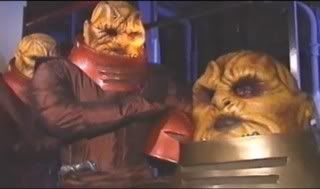 And some weird looking Sontarans.
The other video of this ilk worth mentioning is "Downtime", although it's a big mess of Yeti, computer viruses, The Brigadier, The Brigadier's daughter, 2nd-Doctor companion Victoria and Sarah Jane Smith. There were also a series out there concerning the X-Files-like investigations of one Liz Shaw and another featuring Autons.
In terms of quality (as memory serves, I should probably try to track down a copy to re-watch) "Shakedown: The Return of the Sontarans" wasn't great, mainly due to the severely low budget of the production (of course we *are* dealing with the Doctor Who universe here) . However despite this hindrance many of these videos were quite fun and better than they should have been, mainly through being very obvious labours of love for all involved. These were productions by fans who wanted to make Doctor Who like they remembered (which explains tendency to use aspects from the 60s and 70s rather than the more recent stories) since the BBC obviously weren't interested.
It could be argued that the show we've been getting out of Wales since 2005 is the ultimate version of this sentiment.
So using an author like Dicks makes sense and the style of story (straight forward action-adventure in space) is quite a contrast from the at times confounding plotting of stories from the 1980s.
And some weird looking Sontarans.
The other video of this ilk worth mentioning is "Downtime", although it's a big mess of Yeti, computer viruses, The Brigadier, The Brigadier's daughter, 2nd-Doctor companion Victoria and Sarah Jane Smith. There were also a series out there concerning the X-Files-like investigations of one Liz Shaw and another featuring Autons.
In terms of quality (as memory serves, I should probably try to track down a copy to re-watch) "Shakedown: The Return of the Sontarans" wasn't great, mainly due to the severely low budget of the production (of course we *are* dealing with the Doctor Who universe here) . However despite this hindrance many of these videos were quite fun and better than they should have been, mainly through being very obvious labours of love for all involved. These were productions by fans who wanted to make Doctor Who like they remembered (which explains tendency to use aspects from the 60s and 70s rather than the more recent stories) since the BBC obviously weren't interested.
It could be argued that the show we've been getting out of Wales since 2005 is the ultimate version of this sentiment.
So using an author like Dicks makes sense and the style of story (straight forward action-adventure in space) is quite a contrast from the at times confounding plotting of stories from the 1980s.
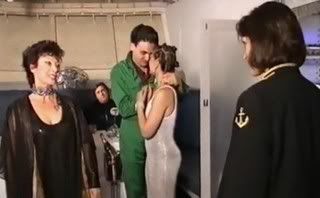 Some familiar faces in unfamiliar roles.
In order to turn a 50-minute show featuring no Doctor or other parts of the show itself (other than the Sontarans) into an official Doctor Who book, Dicks has stuck the plot of the video itself into the middle of the novel. So while the crew of the solar-sailer Tiger Moth are being menaced by Sontarans and a shape-changing Rutan The Doctor & Co. are waiting on nearby planets and space-stations to rejoin the story-proper. If one didn't know about the video the seams aren't *too* visible, well except that a couple of characters who are killed at the climax of the middle-section show up again later in a "Ha Ha! I wasn't really dead!" manner in order to extend the story up to the needed 250 pages. Still, greater crimes of writing have been committed during The New Adventures.
Also, after the mature character-study of The Also People this book is a major step down in terms complexity of writing-style, nothing here is above a 12-year-old's reading level. However one of the appeals of Doctor Who is how the style of story one gets can change wildly from week to week, so it's not really a complaint, just something worth noting. So as such all of Shakedown's characters are fairly broad. And I doubt that it would really be possible for anyone to write an introspective Sontaran.
So, overall Shakedown is a fun if slight book. Terrance Dicks definitely knows how to keep the pages turning. So in the great scheme of The New Adventures I'd rank Shakedown as being good but a trifle disappointing since it never reaches the quality of his earlier Timewyrm: Exodus but is nowhere as awful as his vampire & gangsters opus Blood Harvest.
Some familiar faces in unfamiliar roles.
In order to turn a 50-minute show featuring no Doctor or other parts of the show itself (other than the Sontarans) into an official Doctor Who book, Dicks has stuck the plot of the video itself into the middle of the novel. So while the crew of the solar-sailer Tiger Moth are being menaced by Sontarans and a shape-changing Rutan The Doctor & Co. are waiting on nearby planets and space-stations to rejoin the story-proper. If one didn't know about the video the seams aren't *too* visible, well except that a couple of characters who are killed at the climax of the middle-section show up again later in a "Ha Ha! I wasn't really dead!" manner in order to extend the story up to the needed 250 pages. Still, greater crimes of writing have been committed during The New Adventures.
Also, after the mature character-study of The Also People this book is a major step down in terms complexity of writing-style, nothing here is above a 12-year-old's reading level. However one of the appeals of Doctor Who is how the style of story one gets can change wildly from week to week, so it's not really a complaint, just something worth noting. So as such all of Shakedown's characters are fairly broad. And I doubt that it would really be possible for anyone to write an introspective Sontaran.
So, overall Shakedown is a fun if slight book. Terrance Dicks definitely knows how to keep the pages turning. So in the great scheme of The New Adventures I'd rank Shakedown as being good but a trifle disappointing since it never reaches the quality of his earlier Timewyrm: Exodus but is nowhere as awful as his vampire & gangsters opus Blood Harvest.
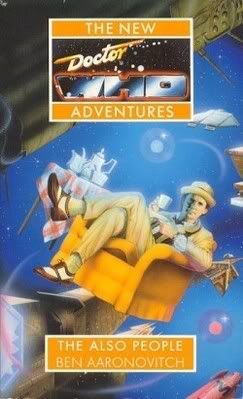 The Also People by Ben Aaronovitch
In Brief: The Doctor and company holiday inside a giant sphere that contains its own sun and two-trillion inhabitants. Conversations with God and Dalek poetry ensue.
Very possibly The Also People is the best entry in the entire New Adventures range. What's surprising is that such high praise doesn't come from a tale of high adventure or timey-wimey shenanigans but rather due to having a book based around well-written and interesting characters in an intriguing setting. While I'm sure the pacing and lack of "action" wouldn't be to everyone's taste (those sad sad people) there's a refreshing maturity to the novel that is hugely appealing. With such a large Tardis team at the moment getting a chance to slow things down and get to know the characters, in particular Chris and Roz, actually improves the entire series as we can get much more invested in events when we understand their impact on the regulars.
In contrast to Generic Companion #1 and #2 we've had throughout 2011 in the form of Amy and Rory.
Giving his companions a chance to rest The Doctor lands in the WorldSphere on The People, a super-advanced utopian society made up of a combination of biological and mechianical beings. Managing all (including the sphere's artificial sun) is the supercomputer God, who provides for all and asks in return only the occasional conversation and to be able to provide a mysterious yellow dip that nobody eats at parties. While of course The Doctor has ulterior motives (Kadiatu Lethbridge-Stewart ended up within the WorldSphere after the events of Set Piece) and there is a murder-plot thrown in, most of The Also People revolves around the regular characters as they get to know some of the citizens of the Sphere.
There's also some romance afoot as well for Roz and Chris, although as ever in Who it ends in tears. Benny gets some good moments as she's faced with a deeper understanding of the moral choices that The Doctor has to make, particularly around the now-feral Kadiatu.
I remembered a great deal of this entry in the New Adventures from my original read back in 1995 (in a good way), and was glad to find that the book hasn't aged a bit in the past 16 years (especially after the oh-so-90s Head Games). The Also People is also a great demonstration of how much the New Adventures strove to move beyond just being a tie-in to the TV-show. The appeal for much of Who (at least to me) has always been about how the series centres around throwing its characters (and the audience) into new and unusual situations and seeing the impact (both good and bad).
There's not really much more to say about the book since it's hard to be critical when there's so little here that warrants criticism. The Also People is funny, sad, moving, breezy, deep and everything good about Doctor Who wrapped up in 250+ pages.
The Also People by Ben Aaronovitch
In Brief: The Doctor and company holiday inside a giant sphere that contains its own sun and two-trillion inhabitants. Conversations with God and Dalek poetry ensue.
Very possibly The Also People is the best entry in the entire New Adventures range. What's surprising is that such high praise doesn't come from a tale of high adventure or timey-wimey shenanigans but rather due to having a book based around well-written and interesting characters in an intriguing setting. While I'm sure the pacing and lack of "action" wouldn't be to everyone's taste (those sad sad people) there's a refreshing maturity to the novel that is hugely appealing. With such a large Tardis team at the moment getting a chance to slow things down and get to know the characters, in particular Chris and Roz, actually improves the entire series as we can get much more invested in events when we understand their impact on the regulars.
In contrast to Generic Companion #1 and #2 we've had throughout 2011 in the form of Amy and Rory.
Giving his companions a chance to rest The Doctor lands in the WorldSphere on The People, a super-advanced utopian society made up of a combination of biological and mechianical beings. Managing all (including the sphere's artificial sun) is the supercomputer God, who provides for all and asks in return only the occasional conversation and to be able to provide a mysterious yellow dip that nobody eats at parties. While of course The Doctor has ulterior motives (Kadiatu Lethbridge-Stewart ended up within the WorldSphere after the events of Set Piece) and there is a murder-plot thrown in, most of The Also People revolves around the regular characters as they get to know some of the citizens of the Sphere.
There's also some romance afoot as well for Roz and Chris, although as ever in Who it ends in tears. Benny gets some good moments as she's faced with a deeper understanding of the moral choices that The Doctor has to make, particularly around the now-feral Kadiatu.
I remembered a great deal of this entry in the New Adventures from my original read back in 1995 (in a good way), and was glad to find that the book hasn't aged a bit in the past 16 years (especially after the oh-so-90s Head Games). The Also People is also a great demonstration of how much the New Adventures strove to move beyond just being a tie-in to the TV-show. The appeal for much of Who (at least to me) has always been about how the series centres around throwing its characters (and the audience) into new and unusual situations and seeing the impact (both good and bad).
There's not really much more to say about the book since it's hard to be critical when there's so little here that warrants criticism. The Also People is funny, sad, moving, breezy, deep and everything good about Doctor Who wrapped up in 250+ pages.
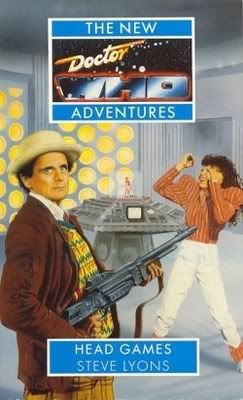 Head Games by Steve Lyons
In Brief: An eruption of fictional-energy threatens the universe. The Doctor, with companions old and new, must deal with the results as his evil doppelganger Dr.Who causes havoc throughout time and space.
Head Games should have been a very good book. Steve Lyons is a decent writer and he is playing with some decidedly good ideas here. Unfortunately a high level of quality only emerges in spurts as overall the novel is decidedly mediocre. The big problem is that much of the story is set on the very bland alien world of Detrios, where the "Fictional Energy" (from Lyons' earlier Conundrum) has resulted in a giant crystal "Miracle" hanging in the sky. While things do improve when the plot moves to 2001 England it still lumbers the novel with some markedly dull passages.
All of the energy leaking out has found its was to Jason, the earlier Master of the Land of Fiction. He subconsciously uses it to create Dr.Who, a comic version of The Doctor who decides that his alter-ego is actually a force for evil and that he and all of his followers (companions) must be destroyed. So what we have is a big metaphor for how The Sevenths Doctor's methods go beyond the black & white plots of his earlier incarnations/stories. His actions are always a choice between consequences (although aren't everyone's?) rather than simply "fighting eveil". While this greying of The Doctor's motivations seems common-place now (what with modern episodes like "Midnight" and "Amy's Choice" showing the character is less than a positive light) for the 1995 this was still fairly new territory.
The other method Head Games uses to comment on how manipulative the 7th-Doctor has become is through having his current Tardis team (Benny, Roz and Chris along and a cameo from Ace) meet previous companion (to the 6th and 7th Doctors) Mel.
Head Games by Steve Lyons
In Brief: An eruption of fictional-energy threatens the universe. The Doctor, with companions old and new, must deal with the results as his evil doppelganger Dr.Who causes havoc throughout time and space.
Head Games should have been a very good book. Steve Lyons is a decent writer and he is playing with some decidedly good ideas here. Unfortunately a high level of quality only emerges in spurts as overall the novel is decidedly mediocre. The big problem is that much of the story is set on the very bland alien world of Detrios, where the "Fictional Energy" (from Lyons' earlier Conundrum) has resulted in a giant crystal "Miracle" hanging in the sky. While things do improve when the plot moves to 2001 England it still lumbers the novel with some markedly dull passages.
All of the energy leaking out has found its was to Jason, the earlier Master of the Land of Fiction. He subconsciously uses it to create Dr.Who, a comic version of The Doctor who decides that his alter-ego is actually a force for evil and that he and all of his followers (companions) must be destroyed. So what we have is a big metaphor for how The Sevenths Doctor's methods go beyond the black & white plots of his earlier incarnations/stories. His actions are always a choice between consequences (although aren't everyone's?) rather than simply "fighting eveil". While this greying of The Doctor's motivations seems common-place now (what with modern episodes like "Midnight" and "Amy's Choice" showing the character is less than a positive light) for the 1995 this was still fairly new territory.
The other method Head Games uses to comment on how manipulative the 7th-Doctor has become is through having his current Tardis team (Benny, Roz and Chris along and a cameo from Ace) meet previous companion (to the 6th and 7th Doctors) Mel.
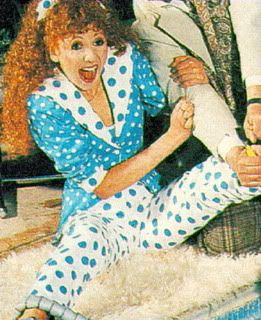
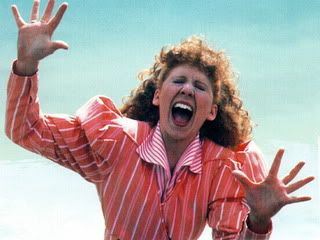 I know, I missed her too.
The good part of Mel returning is that through her disgust of the actions of the current Doctor (basically forcing Detrios to suffer to save the universe) we get a good sense of how much he has changed from earlier "simpler" times. Unfortunately I think Lyons missed an opportunity to do something interesting with her character, since for the most part she comes across as a shrill and irritating screamer (so exactly how she was portrayed on TV). This would have been a great chance to try give her a bit of depth.
As a side note the big problem with Mel (as well as Peri) is that she was always too much of a "throw-back" character on the show, as if the production team at the time were looking to the 60s & 70s (in particular regulars like Victoria and Jo Grant) for inspiration. Unfortunately in 1985/86 having such a character was *exactly* the wrong decision to make; they needed something new to reinvigorate the series. Thankfully that happened in 1987 when Ace joined (although by then it was probably too little, too late). Watching episodes with Mel is frustrating, since Bonnie Langford *is* actually a very good actress but was unfortunately lumbered with a terrible character to play.
Ok, back to Head Games itself. While a lot of the book doesn't quite work it's still a hugely important part of The New Adventures. It acts as a big marker for how much the novels and The Doctor have developed since the early days. The book is essentially a big thumb in the nose to fans at the time who complained (oh how they complained, particularly in Internet newsgroups...) that the books just "weren't Doctor Who". As with modern times, a lot of people had a set idea of what Doctor Who should be like, which was The Doctor thwarting alien invaders and toppling corrupt governments and nothing else. Dr.Who exists to show how unsatisfying such a character can be. Not even Superman would be so empty.
The book also gives the reader insight into the 7th-Doctor, in particular when confronted by the manifestation of his 6th persona. We get into some serious continuity references here as we learn that the 7th Doctor "forced" himself into being to keep the unhinged 6th from becoming the evil Valeyard (if this doesn't make sense go and watch the monumental mess that is The Trial of a Timelord, if you dare). But again I'm discussing plot-points of the novel rather than actually reviewing the thing.
And that's the big problem, while the book has some BIG THINGS happen that are worth discussing the parts just don't add up to a satisfying whole. The narrative is too much of a mess and the non-regulars aren't interesting at all. I can see what Steve Lyons was aiming for and it was a good idea, it's just that he doesn't manage to pull it off. Overall Head Games, while clever, is just too much of a mess to recommend.
I know, I missed her too.
The good part of Mel returning is that through her disgust of the actions of the current Doctor (basically forcing Detrios to suffer to save the universe) we get a good sense of how much he has changed from earlier "simpler" times. Unfortunately I think Lyons missed an opportunity to do something interesting with her character, since for the most part she comes across as a shrill and irritating screamer (so exactly how she was portrayed on TV). This would have been a great chance to try give her a bit of depth.
As a side note the big problem with Mel (as well as Peri) is that she was always too much of a "throw-back" character on the show, as if the production team at the time were looking to the 60s & 70s (in particular regulars like Victoria and Jo Grant) for inspiration. Unfortunately in 1985/86 having such a character was *exactly* the wrong decision to make; they needed something new to reinvigorate the series. Thankfully that happened in 1987 when Ace joined (although by then it was probably too little, too late). Watching episodes with Mel is frustrating, since Bonnie Langford *is* actually a very good actress but was unfortunately lumbered with a terrible character to play.
Ok, back to Head Games itself. While a lot of the book doesn't quite work it's still a hugely important part of The New Adventures. It acts as a big marker for how much the novels and The Doctor have developed since the early days. The book is essentially a big thumb in the nose to fans at the time who complained (oh how they complained, particularly in Internet newsgroups...) that the books just "weren't Doctor Who". As with modern times, a lot of people had a set idea of what Doctor Who should be like, which was The Doctor thwarting alien invaders and toppling corrupt governments and nothing else. Dr.Who exists to show how unsatisfying such a character can be. Not even Superman would be so empty.
The book also gives the reader insight into the 7th-Doctor, in particular when confronted by the manifestation of his 6th persona. We get into some serious continuity references here as we learn that the 7th Doctor "forced" himself into being to keep the unhinged 6th from becoming the evil Valeyard (if this doesn't make sense go and watch the monumental mess that is The Trial of a Timelord, if you dare). But again I'm discussing plot-points of the novel rather than actually reviewing the thing.
And that's the big problem, while the book has some BIG THINGS happen that are worth discussing the parts just don't add up to a satisfying whole. The narrative is too much of a mess and the non-regulars aren't interesting at all. I can see what Steve Lyons was aiming for and it was a good idea, it's just that he doesn't manage to pull it off. Overall Head Games, while clever, is just too much of a mess to recommend.
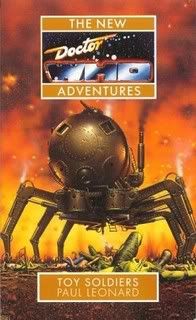 Toy Soldiers by Paul Leonard
In Brief: It's 1919 and aliens are kidnapping children and forcing them to become soldiers in a meaningless war on a far-off world.
The Doctor is not amused.
Toy Soldiers, like Zamper immediately before, is a book for which I held absolutely no memory. Re-reading it now I can understand why, the characters and situations just never rise above being "a bit dull". There's not enough plot to sustain an entire novel and several parts of the book are taken up with descriptions of various air and ground battles on the alien planet that become a bit tedious. Also the author becomes rather heavy-handed in his anti-war message so things turn a little preachy. While I'm all for a nice pacifist message I've seen it done better elsewhere (such as in Human Nature).
Also the book is lacking a decent antagonist. While the reason behind the kidnappings (a big alien computer trying force technological upgrade through war) makes sense and fits in with the "pointlessness of war" theme it leave the reader feeling somewhat unsatisfied.
However there are some aspects of the book that work well and raises Toy Soldiers into the ranks of the "mediocre yet worthy". The novel makes good use of Chris and Roz for once, who in being separated from The Doctor and Benny for much of the book get a chance to develop as characters as they're forced to cope with 1919 attitudes. Roz gets some good moments as she slowly comes to realise the prejudice surrounding her darker than average skin.
Benny also gets a good chunk of the action, as she struggles to break her brain-washing when she is captured and sent to the alien war-zone. The Doctor is absent for long stretches of the book, which works well as it forces the other characters to figure out problems on their own.
While nothing in the book is actually bad the whole thing is just uninspired. There's nothing in the book that's really that much different from what has gone before in the New Adventures. With the subject matter and setting Toy Soldiers should have been one of the highlights of the series but as it is just remains a forgotten and forgettable entry in the lexicon of Who.
Toy Soldiers by Paul Leonard
In Brief: It's 1919 and aliens are kidnapping children and forcing them to become soldiers in a meaningless war on a far-off world.
The Doctor is not amused.
Toy Soldiers, like Zamper immediately before, is a book for which I held absolutely no memory. Re-reading it now I can understand why, the characters and situations just never rise above being "a bit dull". There's not enough plot to sustain an entire novel and several parts of the book are taken up with descriptions of various air and ground battles on the alien planet that become a bit tedious. Also the author becomes rather heavy-handed in his anti-war message so things turn a little preachy. While I'm all for a nice pacifist message I've seen it done better elsewhere (such as in Human Nature).
Also the book is lacking a decent antagonist. While the reason behind the kidnappings (a big alien computer trying force technological upgrade through war) makes sense and fits in with the "pointlessness of war" theme it leave the reader feeling somewhat unsatisfied.
However there are some aspects of the book that work well and raises Toy Soldiers into the ranks of the "mediocre yet worthy". The novel makes good use of Chris and Roz for once, who in being separated from The Doctor and Benny for much of the book get a chance to develop as characters as they're forced to cope with 1919 attitudes. Roz gets some good moments as she slowly comes to realise the prejudice surrounding her darker than average skin.
Benny also gets a good chunk of the action, as she struggles to break her brain-washing when she is captured and sent to the alien war-zone. The Doctor is absent for long stretches of the book, which works well as it forces the other characters to figure out problems on their own.
While nothing in the book is actually bad the whole thing is just uninspired. There's nothing in the book that's really that much different from what has gone before in the New Adventures. With the subject matter and setting Toy Soldiers should have been one of the highlights of the series but as it is just remains a forgotten and forgettable entry in the lexicon of Who.
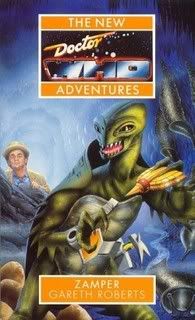 Zamper by Gareth Roberts
In Brief: The hidden warship-building planet of Zamper holds a Terrible Secret.
Don't they all?
Giant turtles are involved.
The quality of The New Adventures, over the (dear lord) 40+ books I've now read, have ranged from Excellent to Alright to Terrible to the depths of "My Eyes! My Precious Eyes!". I say this because while Zamper is not-a-very-good-book (a ranking just above Terrible) I say so more since it's a disappointment rather than it being the affront to my sanity that a few of these books have been.
The one with the psychic space-squirrels still gives me nightmares.
I should have expected that I wouldn't be impressed by the book considering that this is one of the few novels in the range for which I had absolutely no memory. Almost every other book in the New Adventures I recall some sort of snippet or event at least, however Zamper was a complete blank.
The plot: The Doctor & Co. crash on a planet that produces the galaxy's best warships through a lightly manned (4 people) underground base. Also present are a couple of The Chelonians (giant militaristic turtles last seen in Roberts' The Highest Science) who are buying a ship with which to reclaim past glories, or something. However the automated "Management" that runs the facility is breaking down, and the slug-like Zamps, who actually construct the ships are beginning to act very odd indeed.
The biggest problem with the book is that for the first 3/4rds or so nothing much really happens. Most of the characters just wander around the facility bitching at each other while The Doctor heads into some underground caves where he spends almost all of the book. With a less than interesting setting (a planet that looks like a quarry with purple skies. I thought these books were supposed to give us things *not* seen in the original series) and forgettable characters a decent plot would have at least livened things up. Unfortunately that decent plot is nowhere to be found here, as mentioned things sort of meander along until a "twist" (spoiler: The Zamps and The Management are actually EVIL (Bwahahahah!)) towards the end moves everything into silly-action territory.
Gareth Roberts has done his best, his writing style is still very good and up until the last act there's still a sense that there will be a decent pay-off. It's just that pay-off never happens and instead everything is concluded with everything and everyone (who isn't a regular) blowing up. As for the regulars, The Doctor is pretty much side-lined throughout although Benny does get some good bits when interacting with the Chelonians. Having Ace leave has been a definitely benefit to her character. However Chris & Roz have yet to show any real spark as part of the Tardis crew; Roz in particular suffering as she seems more and more like Ace-light in her stories so far.
So while I didn't find reading Zamper to be a chore (at least it's short), I did find it to be a completely sub-par entry in the series. While there have been worse Doctor Who stories (much, much worse) written that's hardly a defence of the book. No part of Roberts' effort here even seem to be trying to rise above mediocre, which is a shame for an author who normally manages to write something much better. I suspect that my new memories of this book will once again be quickly forgotten...
Zamper by Gareth Roberts
In Brief: The hidden warship-building planet of Zamper holds a Terrible Secret.
Don't they all?
Giant turtles are involved.
The quality of The New Adventures, over the (dear lord) 40+ books I've now read, have ranged from Excellent to Alright to Terrible to the depths of "My Eyes! My Precious Eyes!". I say this because while Zamper is not-a-very-good-book (a ranking just above Terrible) I say so more since it's a disappointment rather than it being the affront to my sanity that a few of these books have been.
The one with the psychic space-squirrels still gives me nightmares.
I should have expected that I wouldn't be impressed by the book considering that this is one of the few novels in the range for which I had absolutely no memory. Almost every other book in the New Adventures I recall some sort of snippet or event at least, however Zamper was a complete blank.
The plot: The Doctor & Co. crash on a planet that produces the galaxy's best warships through a lightly manned (4 people) underground base. Also present are a couple of The Chelonians (giant militaristic turtles last seen in Roberts' The Highest Science) who are buying a ship with which to reclaim past glories, or something. However the automated "Management" that runs the facility is breaking down, and the slug-like Zamps, who actually construct the ships are beginning to act very odd indeed.
The biggest problem with the book is that for the first 3/4rds or so nothing much really happens. Most of the characters just wander around the facility bitching at each other while The Doctor heads into some underground caves where he spends almost all of the book. With a less than interesting setting (a planet that looks like a quarry with purple skies. I thought these books were supposed to give us things *not* seen in the original series) and forgettable characters a decent plot would have at least livened things up. Unfortunately that decent plot is nowhere to be found here, as mentioned things sort of meander along until a "twist" (spoiler: The Zamps and The Management are actually EVIL (Bwahahahah!)) towards the end moves everything into silly-action territory.
Gareth Roberts has done his best, his writing style is still very good and up until the last act there's still a sense that there will be a decent pay-off. It's just that pay-off never happens and instead everything is concluded with everything and everyone (who isn't a regular) blowing up. As for the regulars, The Doctor is pretty much side-lined throughout although Benny does get some good bits when interacting with the Chelonians. Having Ace leave has been a definitely benefit to her character. However Chris & Roz have yet to show any real spark as part of the Tardis crew; Roz in particular suffering as she seems more and more like Ace-light in her stories so far.
So while I didn't find reading Zamper to be a chore (at least it's short), I did find it to be a completely sub-par entry in the series. While there have been worse Doctor Who stories (much, much worse) written that's hardly a defence of the book. No part of Roberts' effort here even seem to be trying to rise above mediocre, which is a shame for an author who normally manages to write something much better. I suspect that my new memories of this book will once again be quickly forgotten...
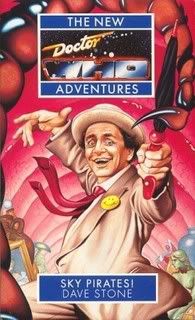 Sky Pirates! by Dave Stone
In Brief: The Doctor, Benny, Chris and Roz find themselves in a nihilistic version of The HitchHiker's Guide to the Galaxy.
But with song-and-dance numbers.
Insane, bizarre, probably divisive and quite quite enjoyable, Sky Pirates! is definitely one of the most memorable of the books in the entire range of New Adventures. While I imagine the book wouldn't be to everyone's taste the huge imagination involved in Stone's world-building mixed with his OTT writing-style meant that I was totally with this book from Page 1.
That's not to say that the book is perfect, it could probably due with a bit more focus and a bit of an edit (at 300 pages it's the longest of the New Adventures), but at the same time I don't mind a bit of indulgence here and there when the result is so enjoyable.
So what is the book about anyways? The Tardis falls into a small pocket universe known as The System, which is filled with a variety of humanoid species on a collection of rather improbable planets. However The System has been invaded by the villainous shape-shifting blobby Sloathes, who are enslaving the local population and stealing all of their pretty things. Add to this a pirate crew, a "chosen one" and a quest for The Eyes That Will Save Everything. The book goes for a bit of a "quest" feel as the regulars (including new additions Chris and Roz, a little underused) end up in various parts of The System over a course of several weeks.
Sky Pirates! is a great book for Benny, as the sense of humour which follows the character is really allowed to come to the fore-front as she's faced with planets shaped like snowmen and a sun with a giant smiley-face on it. However it's her view of The Doctor that really stands out in the book, as she realises that her earlier hope of being an equal to him was a false hope, at best she might be a prized pet. That's not to say that the book makes The Doctor out to be uncaring, but this is easily the character at his most manipulative and alien, getting people to do what he needs through subtle hints and false comedy. The climax in particular, as The Doctor faces the reason The System has him at his most God-like and terrifying (although that's not visible to most).
So while much of Sky Pirates! at first seems to be extremely OTT by the end it's surprising at how serious, and actually horrific, much of what happens ends up being. Like the earlier Parasite this is a disaster of huge proportions, with only the survival of a few giving a sense of victory (well relatively few compared to the earlier book's survival-rate of none). Still, the book is hardly a downer. In fact it in many ways pushes the Doctor Who envelope farther than any other book so far (and definitely more than almost any TV-story). Although I guess that's the benefit of a novel not having to worry about the budget.
So an excellent, if diabolical, entry into the series. This book has reminded me about how enjoyable Who can be when it goes for something new and succeeds.
Sky Pirates! by Dave Stone
In Brief: The Doctor, Benny, Chris and Roz find themselves in a nihilistic version of The HitchHiker's Guide to the Galaxy.
But with song-and-dance numbers.
Insane, bizarre, probably divisive and quite quite enjoyable, Sky Pirates! is definitely one of the most memorable of the books in the entire range of New Adventures. While I imagine the book wouldn't be to everyone's taste the huge imagination involved in Stone's world-building mixed with his OTT writing-style meant that I was totally with this book from Page 1.
That's not to say that the book is perfect, it could probably due with a bit more focus and a bit of an edit (at 300 pages it's the longest of the New Adventures), but at the same time I don't mind a bit of indulgence here and there when the result is so enjoyable.
So what is the book about anyways? The Tardis falls into a small pocket universe known as The System, which is filled with a variety of humanoid species on a collection of rather improbable planets. However The System has been invaded by the villainous shape-shifting blobby Sloathes, who are enslaving the local population and stealing all of their pretty things. Add to this a pirate crew, a "chosen one" and a quest for The Eyes That Will Save Everything. The book goes for a bit of a "quest" feel as the regulars (including new additions Chris and Roz, a little underused) end up in various parts of The System over a course of several weeks.
Sky Pirates! is a great book for Benny, as the sense of humour which follows the character is really allowed to come to the fore-front as she's faced with planets shaped like snowmen and a sun with a giant smiley-face on it. However it's her view of The Doctor that really stands out in the book, as she realises that her earlier hope of being an equal to him was a false hope, at best she might be a prized pet. That's not to say that the book makes The Doctor out to be uncaring, but this is easily the character at his most manipulative and alien, getting people to do what he needs through subtle hints and false comedy. The climax in particular, as The Doctor faces the reason The System has him at his most God-like and terrifying (although that's not visible to most).
So while much of Sky Pirates! at first seems to be extremely OTT by the end it's surprising at how serious, and actually horrific, much of what happens ends up being. Like the earlier Parasite this is a disaster of huge proportions, with only the survival of a few giving a sense of victory (well relatively few compared to the earlier book's survival-rate of none). Still, the book is hardly a downer. In fact it in many ways pushes the Doctor Who envelope farther than any other book so far (and definitely more than almost any TV-story). Although I guess that's the benefit of a novel not having to worry about the budget.
So an excellent, if diabolical, entry into the series. This book has reminded me about how enjoyable Who can be when it goes for something new and succeeds.




















